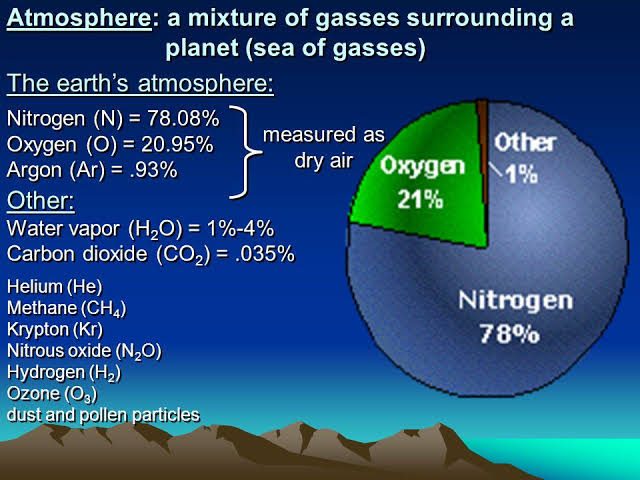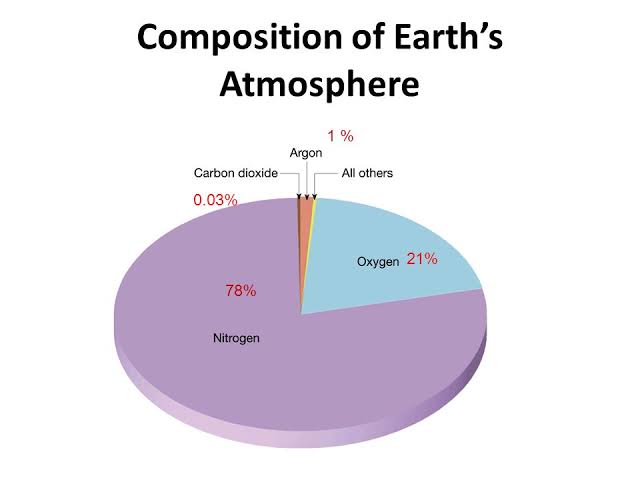Hi Friends .
Like Shear and Comments these Post.
Gasses on Earth
 पृथ्वी का वातावरण:-
पृथ्वी का वातावरण:-
पृथ्वी का वायुमंडल पृथ्वी के चारों ओर गैसों की एक परत है और पृथ्वी के गुरुत्वाकर्षण द्वारा आयोजित किया जाता है।
इसमें आमतौर पर 78% नाइट्रोजन और 21% ऑक्सीजन 0.97% आर्गन और कार्बन डाइऑक्साइड 0.04% विभिन्न गैसों और जल वाष्प की मात्रा का अनुसरण करते हैं।
गैसों के इस मिश्रण को आमतौर पर हवा के रूप में जाना जाता है।
वातावरण दिन और रात के बीच उज्ज्वल सौर विकिरण को अवशोषित करके और तापमान चरम सीमा को कम करके पृथ्वी पर जीवन की रक्षा करता है।
यह धीरे-धीरे अधिक पतला हो जाता है और अंतरिक्ष में दूर हो जाता है।
वायुमंडल और अंतरिक्ष के बीच कोई अचूक सीमा नहीं है।
वातावरण के द्रव्यमान का सत्तर प्रतिशत ग्रह की सतह से 11 किमी अंदर है।
हवा की संरचना:-
जैसा कि नासा ने संकेत दिया है, पृथ्वी के वायुमंडल में गैसों में शामिल हैं:
नाइट्रोजन - 78 प्रतिशत
ऑक्सीजन - 21 प्रतिशत
आर्गन - 0.93 प्रतिशत
कार्बन डाइऑक्साइड - 0.04 प्रतिशत
नियोन, हीलियम, मीथेन, क्रिप्टन और हाइड्रोजन, साथ ही साथ जल वाष्प की मात्रा का पालन करें।
वायुमंडल में गैसों की पूर्णता:-
यह तालिका पृथ्वी के वायुमंडल के निचले हिस्से (25 किमी तक) में ग्यारह सबसे प्रचुर गैसों को सूचीबद्ध करती है। जबकि नाइट्रोजन और ऑक्सीजन का प्रतिशत वास्तव में स्थिर है, ग्रीनहाउस गैसों का माप बदलता है और क्षेत्र पर निर्भर करता है। जल वाष्प अविश्वसनीय रूप से कारक है। पार्च्ड या बहुत मिर्च क्षेत्रों में, जल वाष्प लगभग अनुपस्थित हो सकता है। गर्म, उष्णकटिबंधीय क्षेत्रों में, जल वाष्प वायुमंडलीय गैसों के एक महत्वपूर्ण खंड के लिए खाता है।
कुछ संदर्भ इस सूची के लिए अलग-अलग गैसों को याद करते हैं, जैसे कि क्रिप्टन (हीलियम से कम प्रचुर मात्रा में, हालांकि हाइड्रोजन से अधिक), क्सीनन (हाइड्रोजन से कम प्रचुर मात्रा में), नाइट्रोजन डाइऑक्साइड (ओजोन से कम प्रचुर मात्रा में), और आयोडीन (ओजोन से कम प्रचुर मात्रा में)।
गैस फॉर्मूला प्रतिशत मात्रा
नाइट्रोजन N2 78.08%
ऑक्सीजन O2 20.95%
पानी * H2O 0% से 4%
आर्गन Ar 0.93%
कार्बन डाइऑक्साइड * CO2 0.0360%
नियॉन ने Ne 0.0018%
हीलियम वह He 0.0005%
मीथेन * CH4 0.00017%
हाइड्रोजन H2 0.00005%
नाइट्रस ऑक्साइड * N2O 0.0003%
ओजोन * O3 0.000004%
* चर रचना के साथ गैसें
ग्रीनहाउस गैसों कार्बन डाइऑक्साइड, मीथेन और नाइट्रस डाइऑक्साइड का सामान्य केंद्रीकरण बढ़ रहा है। ओजोन शहरों के आसपास और पृथ्वी के समताप मंडल में सोचा जाता है। टेबल और क्रिप्टन, क्सीनन, नाइट्रोजन डाइऑक्साइड और आयोडीन (पूर्व संदर्भित सभी) में तत्वों के बावजूद, महक वाले लवण, कार्बन मोनोऑक्साइड और कई अलग-अलग गैसों की मात्रा का पालन किया जाता है।
Gasses on Earth
Earth's atmosphere :-
Earth's atmosphere is a layer of gases surrounding the planet Earth and held by the Earth's gravity.
It contains generally 78% nitrogen and 21% oxygen 0.97% argon and carbon dioxide 0.04% follow amounts of different gases, and water vapor.

Earth's atmosphere is a layer of gases surrounding the planet Earth and held by the Earth's gravity.
It contains generally 78% nitrogen and 21% oxygen 0.97% argon and carbon dioxide 0.04% follow amounts of different gases, and water vapor.
This blend of gases is usually known as air.
The atmosphere protects life on Earth by absorbing bright solar radiation and lessening temperature extremes among day and night.
The atmosphere has no unexpected cut-off.
It slowly becomes more slender and fades away into space.
There is no unmistakable limit between the atmosphere and space.
Seventy five percent of the atmosphere's mass is inside 11 km of the planetary surface.
Composition of air :-
As indicated by NASA, the gases in Earth's atmosphere include:
Nitrogen — 78 percent
Oxygen — 21 percent
Argon — 0.93 percent
Carbon dioxide — 0.04 percent
Follow amounts of neon, helium, methane, krypton and hydrogen, as well as water vapor.
Plenitude of Gases in the Atmosphere :-
This table lists the eleven most abundant gases in the lower part of Earth's atmosphere (up to 25 km). While the percentage of nitrogen and oxygen are genuinely stable, the measure of greenhouse gases changes and depends on area. Water vapor is incredibly factor. In parched or very chilly regions, water vapor might be almost absent. In warm, tropical regions, water vapor accounts for a significant segment of atmospheric gases.
Some references remember different gases for this list, such as krypton (less abundant than helium, however more than hydrogen), xenon (less abundant than hydrogen), nitrogen dioxide (less abundant than ozone), and iodine (less abundant than ozone).
The atmosphere protects life on Earth by absorbing bright solar radiation and lessening temperature extremes among day and night.
The atmosphere has no unexpected cut-off.
It slowly becomes more slender and fades away into space.
There is no unmistakable limit between the atmosphere and space.
Seventy five percent of the atmosphere's mass is inside 11 km of the planetary surface.
Composition of air :-
As indicated by NASA, the gases in Earth's atmosphere include:
Nitrogen — 78 percent
Oxygen — 21 percent
Argon — 0.93 percent
Carbon dioxide — 0.04 percent
Follow amounts of neon, helium, methane, krypton and hydrogen, as well as water vapor.
Plenitude of Gases in the Atmosphere :-
This table lists the eleven most abundant gases in the lower part of Earth's atmosphere (up to 25 km). While the percentage of nitrogen and oxygen are genuinely stable, the measure of greenhouse gases changes and depends on area. Water vapor is incredibly factor. In parched or very chilly regions, water vapor might be almost absent. In warm, tropical regions, water vapor accounts for a significant segment of atmospheric gases.
Some references remember different gases for this list, such as krypton (less abundant than helium, however more than hydrogen), xenon (less abundant than hydrogen), nitrogen dioxide (less abundant than ozone), and iodine (less abundant than ozone).
Gas Formula Percent Volume
Nitrogen N2 78.08%
Oxygen O2 20.95%
Water* H2O 0% to 4%
Argon Ar 0.93%
Carbon Dioxide* CO2 0.0360%
Neon Ne 0.0018%
Helium He 0.0005%
Methane* CH4 0.00017%
Hydrogen H2 0.00005%
Nitrous Oxide* N2O 0.0003%
Ozone* O3 0.000004%
* gases with variable composition

The normal centralization of the greenhouse gases carbon dioxide, methane, and nitrous dioxide has been increasing. Ozone is thought around cities and in the Earth's stratosphere. Notwithstanding the elements in the table and krypton, xenon, nitrogen dioxide, and iodine (all referenced prior), there are follow amounts of smelling salts, carbon monoxide, and several different gases.
Nitrogen N2 78.08%
Oxygen O2 20.95%
Water* H2O 0% to 4%
Argon Ar 0.93%
Carbon Dioxide* CO2 0.0360%
Neon Ne 0.0018%
Helium He 0.0005%
Methane* CH4 0.00017%
Hydrogen H2 0.00005%
Nitrous Oxide* N2O 0.0003%
Ozone* O3 0.000004%
* gases with variable composition

The normal centralization of the greenhouse gases carbon dioxide, methane, and nitrous dioxide has been increasing. Ozone is thought around cities and in the Earth's stratosphere. Notwithstanding the elements in the table and krypton, xenon, nitrogen dioxide, and iodine (all referenced prior), there are follow amounts of smelling salts, carbon monoxide, and several different gases.
पृथ्वी का वायुमंडल पृथ्वी के चारों ओर गैसों की एक परत है और पृथ्वी के गुरुत्वाकर्षण द्वारा आयोजित किया जाता है।
इसमें आमतौर पर 78% नाइट्रोजन और 21% ऑक्सीजन 0.97% आर्गन और कार्बन डाइऑक्साइड 0.04% विभिन्न गैसों और जल वाष्प की मात्रा का अनुसरण करते हैं।
गैसों के इस मिश्रण को आमतौर पर हवा के रूप में जाना जाता है।
वातावरण दिन और रात के बीच उज्ज्वल सौर विकिरण को अवशोषित करके और तापमान चरम सीमा को कम करके पृथ्वी पर जीवन की रक्षा करता है।
यह धीरे-धीरे अधिक पतला हो जाता है और अंतरिक्ष में दूर हो जाता है।
वायुमंडल और अंतरिक्ष के बीच कोई अचूक सीमा नहीं है।
वातावरण के द्रव्यमान का सत्तर प्रतिशत ग्रह की सतह से 11 किमी अंदर है।
हवा की संरचना:-
जैसा कि नासा ने संकेत दिया है, पृथ्वी के वायुमंडल में गैसों में शामिल हैं:
नाइट्रोजन - 78 प्रतिशत
ऑक्सीजन - 21 प्रतिशत
आर्गन - 0.93 प्रतिशत
कार्बन डाइऑक्साइड - 0.04 प्रतिशत
नियोन, हीलियम, मीथेन, क्रिप्टन और हाइड्रोजन, साथ ही साथ जल वाष्प की मात्रा का पालन करें।
वायुमंडल में गैसों की पूर्णता:-
यह तालिका पृथ्वी के वायुमंडल के निचले हिस्से (25 किमी तक) में ग्यारह सबसे प्रचुर गैसों को सूचीबद्ध करती है। जबकि नाइट्रोजन और ऑक्सीजन का प्रतिशत वास्तव में स्थिर है, ग्रीनहाउस गैसों का माप बदलता है और क्षेत्र पर निर्भर करता है। जल वाष्प अविश्वसनीय रूप से कारक है। पार्च्ड या बहुत मिर्च क्षेत्रों में, जल वाष्प लगभग अनुपस्थित हो सकता है। गर्म, उष्णकटिबंधीय क्षेत्रों में, जल वाष्प वायुमंडलीय गैसों के एक महत्वपूर्ण खंड के लिए खाता है।
कुछ संदर्भ इस सूची के लिए अलग-अलग गैसों को याद करते हैं, जैसे कि क्रिप्टन (हीलियम से कम प्रचुर मात्रा में, हालांकि हाइड्रोजन से अधिक), क्सीनन (हाइड्रोजन से कम प्रचुर मात्रा में), नाइट्रोजन डाइऑक्साइड (ओजोन से कम प्रचुर मात्रा में), और आयोडीन (ओजोन से कम प्रचुर मात्रा में)।
गैस फॉर्मूला प्रतिशत मात्रा
नाइट्रोजन N2 78.08%
ऑक्सीजन O2 20.95%
पानी * H2O 0% से 4%
आर्गन Ar 0.93%
कार्बन डाइऑक्साइड * CO2 0.0360%
नियॉन ने Ne 0.0018%
हीलियम वह He 0.0005%
मीथेन * CH4 0.00017%
हाइड्रोजन H2 0.00005%
नाइट्रस ऑक्साइड * N2O 0.0003%
ओजोन * O3 0.000004%
* चर रचना के साथ गैसें
ग्रीनहाउस गैसों कार्बन डाइऑक्साइड, मीथेन और नाइट्रस डाइऑक्साइड का सामान्य केंद्रीकरण बढ़ रहा है। ओजोन शहरों के आसपास और पृथ्वी के समताप मंडल में सोचा जाता है। टेबल और क्रिप्टन, क्सीनन, नाइट्रोजन डाइऑक्साइड और आयोडीन (पूर्व संदर्भित सभी) में तत्वों के बावजूद, महक वाले लवण, कार्बन मोनोऑक्साइड और कई अलग-अलग गैसों की मात्रा का पालन किया जाता है।



No comments:
Post a Comment